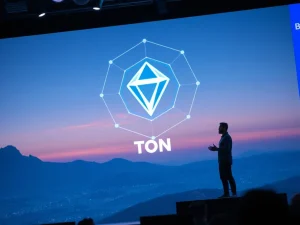Industrial AI: CVector’s $1.5M Boost Fortifies Trust for Critical Infrastructure

In the rapidly evolving world of technology, where innovation often outpaces established norms, the concept of trust remains paramount. For those immersed in the cryptocurrency space, where decentralized networks and immutable ledgers are built on a foundation of cryptographic trust, the importance of reliability is inherently understood. Now, this very principle is gaining crucial traction in the realm of industrial technology. CVector, a pioneering Industrial AI startup, is making waves by securing an impressive $1.5 million in pre-seed funding, not just to advance its technology, but fundamentally to redefine and strengthen customer trust within high-stakes sectors like manufacturing, energy, and utilities. This significant investment underscores a growing recognition that for AI to truly revolutionize critical operations, it must first earn unwavering confidence.
Why is Trust Crucial for Industrial AI in Critical Infrastructure?
Imagine the immense responsibility of managing a national gas utility or a large chemical manufacturing plant. Every decision, every system, carries profound implications for safety, efficiency, and continuity. For operators in these vital sectors, adopting new technologies, especially advanced AI, isn’t just about performance; it’s about absolute reliability and long-term commitment. This is precisely the challenge CVector aims to solve.
A frequent concern voiced by clients, particularly those managing sensitive critical infrastructure, is the longevity of their technology partners. Questions like, “Will you still be here in six months? A year?” highlight a deep-seated apprehension. Many AI startups are often acquired for their talent (acqui-hire) rather than for sustained product development, leaving clients with potentially orphaned systems or disrupted support. This uncertainty is a major barrier to widespread AI trust in environments where stability is non-negotiable. CVector’s founders, Richard Zhang and Tyler Ruggles, directly address this by emphasizing their independence as a core value, positioning CVector as a steadfast and reliable partner.
CVector’s Strategic Pillars for Building Unwavering AI Trust
CVector’s unique approach to fostering trust is built on several foundational pillars, setting them apart in the competitive Industrial AI landscape:
-
Commitment to Independence:
Unlike many startups that eye an early acquisition, CVector’s resolute answer to client longevity concerns is a firm commitment to its independence. This strategy directly aligns with the needs of critical infrastructure operators who demand stable, enduring solutions, not temporary fixes. It assures clients that CVector is investing in long-term relationships and continuous product evolution, not just a quick exit.
-
Deep Domain Expertise and Practical Understanding:
The founders bring a rare blend of high-stakes operational experience. Richard Zhang’s background as a software engineer at Shell provides an intimate understanding of industrial processes and pain points. Tyler Ruggles’ experience maintaining high-uptime systems at the Large Hadron Collider (CERN) offers unparalleled insights into building and managing robust, reliable infrastructure. This practical, hands-on knowledge enables CVector to communicate effectively with clients, truly grasping their challenges—from real-time energy pricing integration to navigating complex legacy system compatibility.
-
Mission-Aligned Team and Investor Support:
The recent pre-seed funding round, led by Schematic Ventures, wasn’t just about capital; it was about strategic alignment. Julian Counihan, a Schematic partner, underscores that true assurance in AI startups stems from a shared mission between founders and customers. CVector’s deliberate focus on recruiting ‘mission-aligned’ team members and actively avoiding acqui-hire scenarios reinforces this dedication. This ensures that everyone within CVector is committed to the long-term success and reliability of their solutions for critical infrastructure.
How Does CVector’s Industrial AI “Brain” Work?
CVector describes its proprietary AI architecture as a “brain and nervous system for industrial assets.” This innovative system is designed to provide adaptive, intelligent insights and control across complex operational environments. Here’s a closer look at its components and capabilities:
-
Hybrid Technology Integration: The platform intelligently combines advanced technologies from diverse fields, including fintech (for high-speed data processing), real-time data analytics, and robust open-source tools. This amalgamation allows for the creation of highly responsive and adaptive AI agents.
-
Adaptive AI Agents for Nuance Detection: These AI agents are designed to identify subtle operational risks and inefficiencies that often escape traditional monitoring methods. For instance, CVector’s system can detect how seemingly minor external factors, like road salt entering factories, might impact sensitive equipment—a critical nuance for maintaining equipment longevity and performance.
-
Bridging Legacy Systems with Modern Insights: A significant challenge in critical infrastructure is the prevalence of outdated grid dispatch systems written in legacy languages such as Cobra and FORTRAN. CVector’s AI agents seamlessly integrate with these older systems, offering operators low-latency insights and enhanced control without requiring a complete overhaul of existing infrastructure. This capability is vital for smooth transitions and continued operational stability.
The Impact of $1.5M Pre-Seed Funding on Scaling Industrial AI Solutions
The successful $1.5 million pre-seed funding round is a testament to investor confidence in CVector’s vision and execution. This capital injection will be instrumental in scaling the deployment of CVector’s sophisticated AI agents across key industrial sectors. With an eight-person team operating across Providence, New York City, and Frankfurt, CVector is poised for significant expansion.
The company plans to intensify its efforts in critical areas such as chemicals, automotive, and energy. This expansion will allow more industrial operators to benefit from CVector’s solutions, which already address complex challenges like optimizing factory operations and ensuring energy grid stability. The funding reinforces CVector’s commitment to long-term growth and its ability to deliver enduring value to its clients, further solidifying AI trust in these vital industries.
What Are the Broader Implications for Critical Infrastructure and Beyond?
CVector’s growth trajectory underscores a broader, undeniable trend: the increasing importance of trust and reliability in the adoption of Industrial AI. By meticulously integrating deep domain-specific expertise with innovative technology, CVector is effectively filling a crucial gap in the market where reliability and longevity are paramount. This isn’t just about deploying advanced algorithms; it’s about building solutions that engineers and operators can stake their careers, and the safety of their communities, on.
Richard Zhang’s vision of scaling to “large-scale critical infrastructure” reflects a wider industry shift towards AI solutions that prioritize stability and resilience alongside raw performance. As Tyler Ruggles aptly observes, the transition from abstract theoretical research to tangible, impactful industrial applications—such as optimizing complex factory operations—demonstrates the profound practical utility of their work. This powerful alignment of mission, cutting-edge technology, and profound operational depth positions CVector to significantly influence how industries globally leverage AI for long-term resilience, enhanced safety, and sustainable profitability. Their success story serves as a compelling case study for how thoughtful, trust-centric AI deployment can transform foundational industries.
Frequently Asked Questions (FAQs)
Q1: What is CVector, and what problem does it solve?
CVector is an Industrial AI startup that aims to build and strengthen trust in AI solutions for critical infrastructure sectors like manufacturing, energy, and chemicals. It addresses client concerns about the longevity and reliability of AI partners by prioritizing independence and long-term commitment over short-term gains, ensuring stable and enduring solutions.
Q2: How does CVector ensure reliability and build AI trust with its clients?
CVector ensures reliability through several key strategies: a strong commitment to independence (avoiding ‘acqui-hire’ scenarios), leveraging the deep domain expertise of its founders (from Shell and the Large Hadron Collider), and fostering a team of ‘mission-aligned’ individuals dedicated to long-term client success. This approach builds unwavering AI trust.
Q3: What kind of technology does CVector use in its Industrial AI solutions?
CVector’s AI architecture is described as a “brain and nervous system for industrial assets.” It combines technologies from fintech, real-time data analytics, and open-source tools to create adaptive AI agents. These agents can identify subtle operational risks and integrate with legacy systems (like Cobra and FORTRAN) to provide low-latency insights and enhanced control.
Q4: What will CVector use its $1.5 million pre-seed funding for?
The $1.5 million pre-seed funding, led by Schematic Ventures, will be used to scale the deployment of CVector’s AI agents. The company plans to expand its operations and solutions into key sectors including chemicals, automotive, and energy, further solidifying its presence and impact in critical infrastructure.
Q5: Who are the founders of CVector, and what are their backgrounds?
CVector was founded by Richard Zhang and Tyler Ruggles. Richard Zhang has a background as a software engineer at Shell, providing him with deep insights into industrial operational demands. Tyler Ruggles has experience maintaining high-uptime systems at the Large Hadron Collider (CERN), contributing expertise in building robust and reliable infrastructure.
Q6: Why is ‘mission alignment’ important for AI startups in critical sectors?
As highlighted by investor Julian Counihan, ‘mission alignment’ between founders, teams, and customers is crucial for true assurance in AI startups, especially in critical sectors. It ensures that the company’s long-term goals are in sync with the client’s need for stable, enduring solutions, mitigating risks associated with potential acquisitions or shifts in focus.









